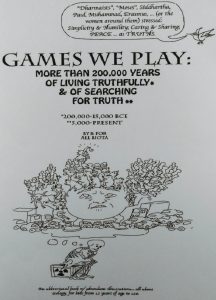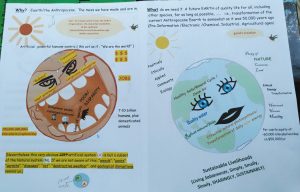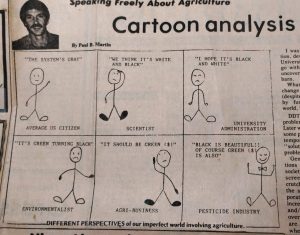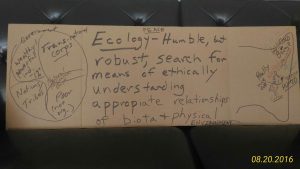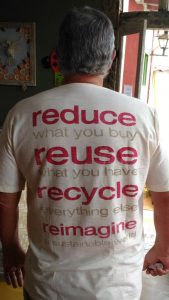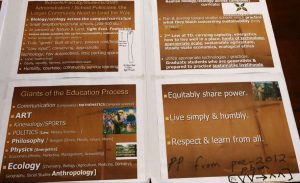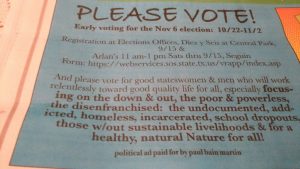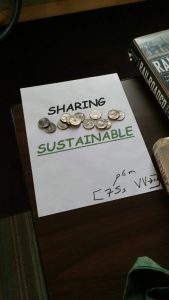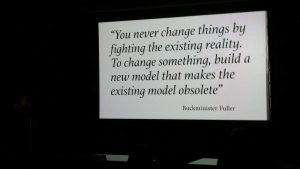Paper presented at the 33rd Annual Conference of the Society of Educators and Scholars, Oct. 2010 p.b. martin et al.
https://bannedbookscafe.blogspot.com/2013/09/normal-0-false-false-false.html
“We know we are in dire straits* as a species, and that we are among associated species facing even more difficult immediate threats … such as extinction by Homo sapiens. At least one billion relatively powerless humans, and great numbers of individuals of other species, are in the midst of unprecedented peril in this moment. Therefore, we must demand that our institutions of learning–from the pre-kindergarten to post-graduate school–unreservedly address the challenge: of lowering ecological footprints and material/energy usage/”abusage” (loss of topsoil, usable water, and biodiversity; and dependence on virtual slaves) in the sectors of the world with power, and of facilitating the increases in these footprints for those lacking power (the objective being an average worldwide per capita ecological footprint of ca. 5 acres and daily energy usage of ca. 60 thousand kilocalories with a very small standard deviation.). Stakeholders should be basing their decisions on ecological principles and processes; they should be thinking critically & creatively and acting in local & global systems with goals of banning inequality, and enhancing conservation, resilience and sustainability. A comprehensive and intensive plan for making this happen through our educational systems is seriously needed. Development of ecology-across-curricula toward ecological literacy and sustainable livelihoods and sustainable community is a moral and ethical imperative for true scholars and educators. Educational systems should be a part of the solution rather than serving to increase the social and ecological problems we all will continue to face in the future if we do not begin to rapidly change our socio-political/economic local and global systems.”
“ … Why are we not hearing more about what is fundamental to the education process and essential to critical thinking** and quality life for all, i.e., ecological literacy and ecology-across-curricula?
We think there are at least seven reasons:
1. Ecological Illiterates. In 2010, most parents, teachers, administrators, education policymakers in the U.S. do not have real knowledge of a concept of ecological literacy (EL) and ecology-across-the-curriculum (EAC). Moreover, their grasp of EAC and EL is probably less than that of parent, teachers, administrators and policymakers in, e.g., the 1930s. (The senior author’s father, who had not attended college, and mother, who only went to school through the eighth grade, knew much more about ecological principles and processes than most folk coming out of college in today’s world.).
A good foundational knowledge in ecological principles and processes is essential to anyone even beginning to understand socio-political/economic systems and for beginning to help move us toward correcting them in an ethical manner, i.e., for the good of rich or poor–including other species–and for as long as possible.
2. Fear of Change. When folk do have an inkling of understanding of what might be meant by EAC, they often generally want to avoid it at all costs (including the costs incurred from the sacrifice of necessary ecological knowledge and actions resulting from critical thinking which would take us toward future quality living within this ecosphere). The reason for this is that their paychecks, interest rates and dividends, yields from stocks and bonds, annuities, government checks, subsidies and assistance, i.e., their relatively comfortable conventional lifestyles, depend upon the bankrupt financial system and fragile socio-economic/political structure which is perilously propped upon a deteriorating natural resource base. And they do not want to rock the boat!
The very powerful, in particular, are reluctant to give up power or even use what they have in order to gain increasing power. Moreover, many of those with power threaten those without similar power with certain job and income loss, in the event that they, the rich and powerful, should lose their own foothold on their exorbitant power.
3. Uncompassionate Apathy. Many people do not de facto care much about the three billion humans who really are struggling to get by in the world and we care even less about other species, especially if they are not mammals or are not relatively large or not stunningly beautiful.
4. Sustainability Is Difficult! (Particularly in a World of 7 Billion and Capitalism). Individuals and world systems are complex, and difficult to reprogram toward conservation and sustainability. Moreover, there are many folk who settle for the status quo, and thus there are many naysayers, cynics and con artists taking a perceived easier path, even while their actions are nudging, shoving or leading us over the cliff..
5. Communication Barriers. It is extremely difficult to even begin to communicate with folk who hold a completely different system of values, especially when these values are on a compellingly attractive and even addictive (yet unfounded) “foundation.”
6. Faster Horses! Older Whiskey! Younger “Mates”! More Money! We generally continue to worship at the altar of growth and big, fast and noisy, and technological and artificial, (and energetically and socio-economically/ecologically costly) … at the expense in particular of “average” students/people.
7. Problems in Knowing When the Well Really Is About to Run Dry. As human populations and their appetites and their technology increase, the finite resources of this finite planet are rapidly tapped into and utilized. But to some extent, everything seems fine up until the depletion of necessary resources (especially macronutrients/essential elements & compounds) is precariously near. It is difficult to know and predict when the last amount of life-essential resources are nearing depletion until very near the end of depletion (or near the point where it is virtually energetically impossible to secure them in sufficient amounts to maintain the homeostasis of life systems). [Dr. Albert Bartlett eloquently and thoroughly discussed this in 1978 in his “Forgotten Fundamentals of the Energy Crisis” www.npg.org/specialreports/bartlett_index.htm ]
(Certainly there have been better analyses of barriers to sustainability, e.g., www.pambazuka.org/en/category/comment/61837 www.viewpointlearning.com/publications/reports/BC_sustainability_0306.pdf ; however, the seven barriers listed are significant.)”
………………………….
*An excellent presentation illustrating the situation in which Homo sapiens finds itself as a species: https://www.youtube.com/watch?v=qPb_0JZ6-Rc&feature=share&fbclid=IwAR2hDnprGfWB7R1n8Z0WXhER6ZGxgZMwDh8O-mWOjYv7Fp7heR_DJB_JYcg
**I’m working on a piece which thoroughly discusses a critical thinking process.
**********************************************************************
pbm 9/4/19
[ 7 Ss->^^ ]
